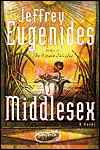
Comment
on this story
|
 |

Two new novels show the importance of plot
by Julia Watts
In recent years many authors of serious literary fiction have joined what has been called the Cult of the Beautiful Sentence. Brand-new Master of Fine Arts degrees in hand, these wordsmiths obey their teachers' orders to "show instead of tell" in their fiction. The prose that results is often beautiful but stationary, like a carefully painted still life. This current trend of elaborately worded but plotless fiction makes me especially grateful to writers like Ian McEwan and Jeffrey Eugenides, who can craft beautiful sentences with the best of them, but who still appreciate the value of old-fashioned, high-quality storytelling.
At the start of Ian McEwan's Atonement (Anchor, $14), we meet Briony, a 13-year-old aspiring writer who is trying to coerce her cousins into acting in "The Trials of Arabella," an  unintentionally hilarious play she has written as a welcome-home gift for her older brother. Truly "The Portrait of the Artist as a Young Control Freak," Briony is constantly frustrated by the limited imaginations of her decidedly non-thespian cousins; her practical older sister, Cecilia; and her neurotic, migraine-suffering mother. Briony is a fascinating character, mature beyond her years in some ways, yet very much a child in others. unintentionally hilarious play she has written as a welcome-home gift for her older brother. Truly "The Portrait of the Artist as a Young Control Freak," Briony is constantly frustrated by the limited imaginations of her decidedly non-thespian cousins; her practical older sister, Cecilia; and her neurotic, migraine-suffering mother. Briony is a fascinating character, mature beyond her years in some ways, yet very much a child in others.
The early chapters of Atonement relate the events that lead Briony to accidentally witnessing two acts—one that would seem shocking to a child but normal to an adult, and another that would shock anyone. The conclusions Briony draws about what she has seen have horrible, unintended consequences: the betrayal and alienation of her sister and the utter ruination of an innocent person's life. Only when Briony grows up does she understand the severity of her crime and realize that she must atone for the pain she has caused.
While no one could ever doubt McEwan's status as a major literary artist, he has also always demonstrated the popular fiction writer's ability to spin a good yarn (albeit an often tangled and kinky one). Atonement is a masterful piece of storytelling, full of surprises and delicious and disturbing developments as it explores the theme of guilt and redemption. A psychologically complex page-turner, it is classic Ian McEwan that will likely turn out to be a classic in the broader sense as well.
Jeffrey Eugenides, author of The Virgin Suicides, just won the Pulitzer Prize for his novel Middlesex (Farrar, Straus, and Giroux, $27). Middlesex is no trifling literary feat; just trying to explain the novel's point of view makes my head swim. Have you ever read a novel written from the omniscient first-person point of view of a character who was raised as a girl but who is now a man? Unless you've already read Middlesex, chances are your answer is no.
Middlesex's narrator is Cal Stephanides, who, at birth, had the external appearance of a girl and so was christened Calliope by his Greek-American parents. But Middlesex is more than  just Cal's story; it's the story of the Stephanides family. The saga starts with Cal's grandparents Lefty and Desdemona, siblings whose incestuous love eventually results in the birth of a grandchild whose genitalia look female but whose genetic makeup is male. Cal traces the history of the mutated gene that came to rest in him. And of course, the history of this gene is also the history of the family, from Lefty and Desdemona's immigration to the U.S. as husband and wife, to their son Milton's ambitions to become an example of the American self-made man. just Cal's story; it's the story of the Stephanides family. The saga starts with Cal's grandparents Lefty and Desdemona, siblings whose incestuous love eventually results in the birth of a grandchild whose genitalia look female but whose genetic makeup is male. Cal traces the history of the mutated gene that came to rest in him. And of course, the history of this gene is also the history of the family, from Lefty and Desdemona's immigration to the U.S. as husband and wife, to their son Milton's ambitions to become an example of the American self-made man.
The Greek-American family in Middlesex is made up of fully realized, complex characters, unlike the comically caricatured Greek-American family of a certain blockbuster movie/sitcom. It is apparent that Nia Vardalos did not write Middlesex—but if she had, would she have called it My Big Fat Greek Hermaphrodite?
Though the whole Stephanides clan is important in the novel, Middlesex's main story still belongs to Cal. As Calliope, Cal is a beautiful little girl who wears frilly dresses and plays with dolls and is a valued half of the little salt-and-pepper-shaker set of children that completes the normal American nuclear family. As an adolescent, though, Cal's life becomes much more difficult. Some of the changes she experiences—an increase in height, some fuzz on her upper lip, the loss of her childhood beauty—can be attributed to normal adolescent hormonal upheaval. Other changes, however, worry both Calliope and her parents—her complete lack of breasts and hips, her failure to start her period. Calliope also keeps one other development a secret from her parents—her growing attraction to girls and to one classmate in particular.
We know from the beginning of the novel that once Cal finds out his genetic identity, he chooses to live as a male, but this early knowledge does not make Calliope's transition into Cal any less fascinating.
Even if it weren't incredibly well-written, Middlesex would be interesting by virtue of being the first major work of fiction to address the lives of intersex people. But Eugenides is a remarkable storyteller, full of both sensitivity and wit (case in point: the novel's title, which refers to both Cal's gender and the name of the suburban street where the Stephanides reside). The sheer scope of the novel, which covers events from 1922 to the present, is impressive, and Eugenides' narrator jumps around the timeline in a way that should seem jerky but is somehow seamless. Between the two-sexed narrator and the non-linear narrative, writing Middlesex must have been a difficult juggling act. But like any good juggler, Eugenides makes keeping all those plates in the air look effortless.

May 29, 2003 * Vol. 13, No. 22
© 2003 Metro Pulse
|